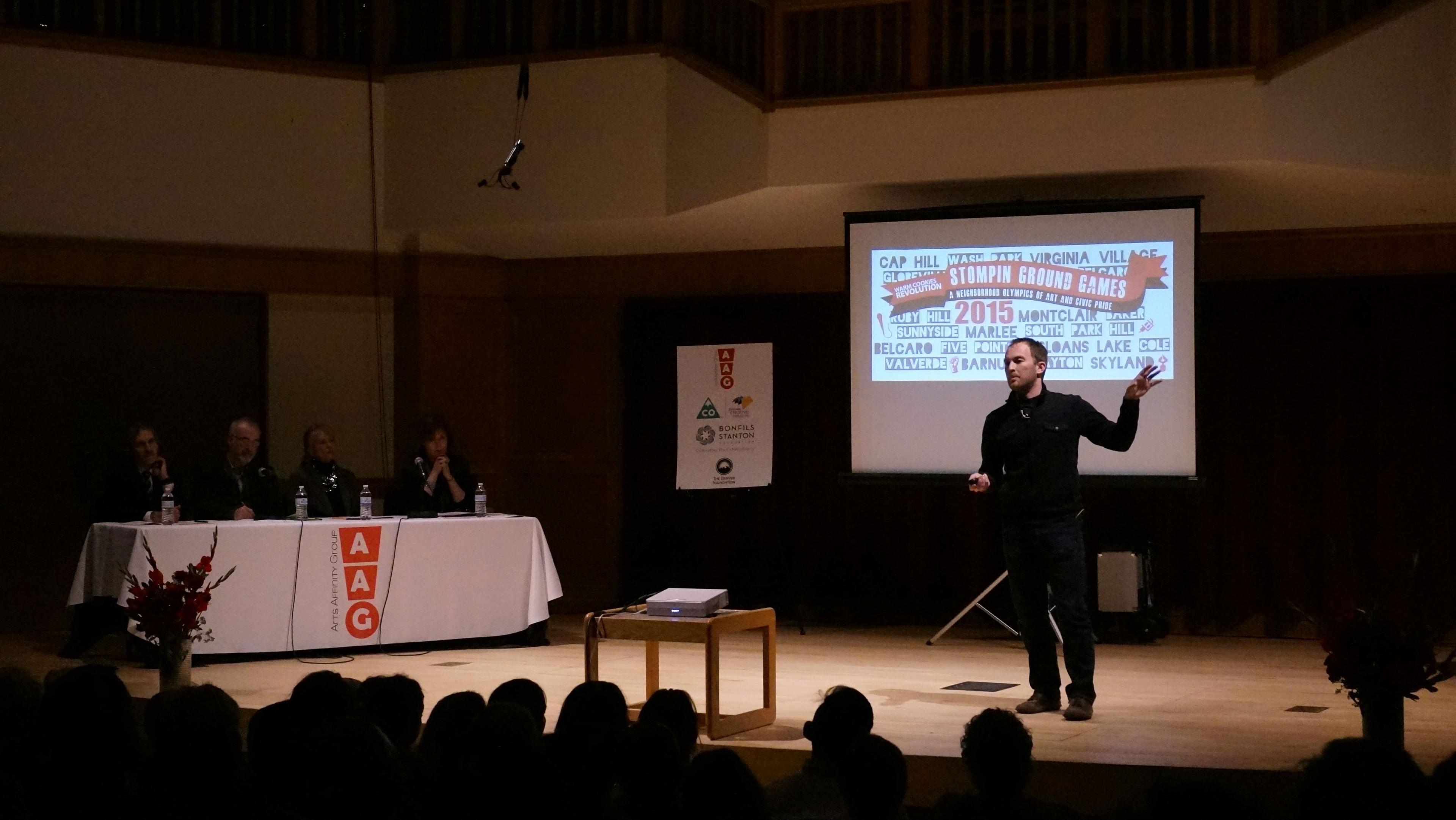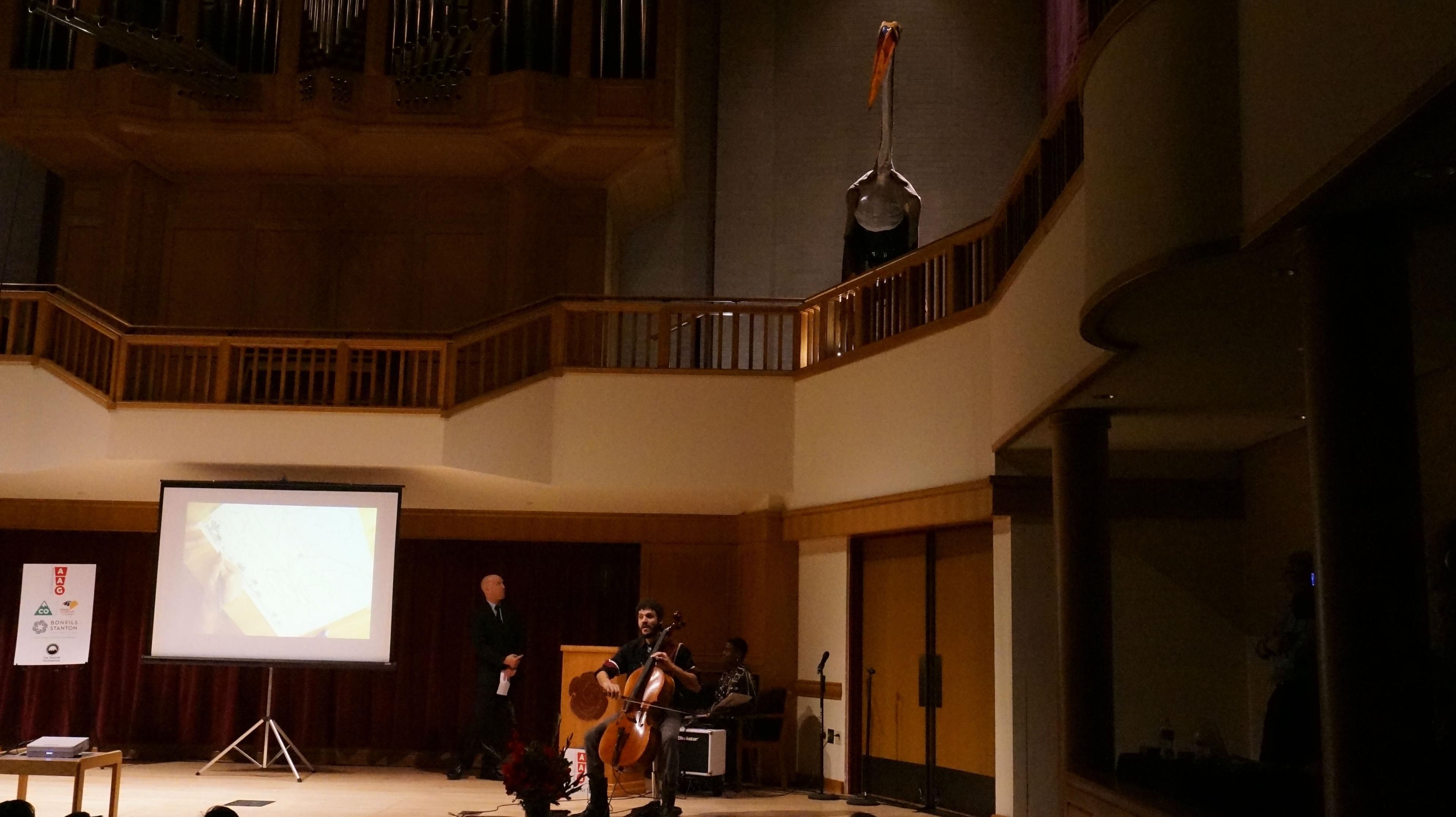
In “Shark Tank,” entrepreneurs try to talk a hard-nosed group of venture capitalists into supporting their projects.
Taking a lead from the hit ABC television series, six Denver-based arts organizations pitched to a team of metro arts professionals and a live audience of invited guests Wednesday night in a bid to secure funding for their projects from a $65,000 pool up for grabs.
The inaugural “Colorado Art Tank” was held at the Newman Center for the Performing Arts at the University of Denver. The Arts Affinity Group (AAG), an arts-dedicated giving division of the Denver Foundation, Colorado’s oldest community foundation, organized the live event.
Arts education nonprofit Pop Culture Classroom was the big winner of the night, earning $25,000 from AAG and $1,000 for the Audience Choice Award.
AAG granted $14,000 to songwriter and musician Ian Cooke and to a project co-presented by Phamaly Theatre Company and the Lone Tree Arts Center. The Bonfils Stanton Foundation, a Denver-based foundation that supports arts and culture, awarded $10,000 to civic activism group Warm Cookies of the Revolution.
No one walked out empty-handed. Both the community-focused fine art school Art Students League of Denver (ASLD) and Denver Botanic Gardens received $500, an acknowledgement for the work they had already done.
The $65,000 worth of funds came from annual AAG member donations as well as contributions from the Denver Foundation, Bonfils Stanton and Colorado Creative Industries (CCI), the cultural arm of the Colorado Office of Economic Development and International Trade.
Presenting art ideas to the “sharks”
The project ideas ran the gamut, from Cooke’s dinosaur-inspired musical production with social commentary, to Warm Cookies of the Revolution’s year-long Olympics-style arts and culture competition between neighborhoods and Pop Culture Classroom's literacy campaign for inmates through graphic novels.
CBS4 broadcast journalist Gloria Neal emceed the event. The panel of judges included: Colorado Creative Industries director of public policy Margaret Hunt, mezzo-soprano singer Marcia Ragonetti, Bonfils Stanton Foundation president and CEO Gary Steuer, and Denver Foundation president and CEO David Miller.
Each organization had five minutes to present its project, followed by a five-minute question-and-answer session. Sometimes presenters were cut off once they reached their time limit.

Panelists then deliberated while audience members voted on which projects they found the most compelling.
For some, the performance-style delivery felt natural.
“As a theater company, it’s really hard to convey an artistic concept in words on paper,” Phamaly’s associate artistic director, Bryce Alexander, said. “So it’s a perfect opportunity to actually connect with an audience and say, ‘Don’t you think this matters?’”
Groups like the Art Students League experimented with ways to up the theatrics. The school used projections and actors to illustrate the concepts behind its project called Moxie Mobile, a series of free lectures and workshops that target creative millennials short on time and money.
Unconventional grant-making
Head of AAG, David Charmatz, said the philanthropic group initially funded cultural projects through traditional means after its inception in 2013. More recently, AAG began looking to the worlds of entrepreneurship, venture capitalism and reality television to find less conventional ways to grant awards.
“We wanted to show that we were willing to be innovative because we expect our applicants to be innovative,” Charmatz said.
Barbara Neal, a Denver arts consultant, heard about the Arizona Commission for the Arts’ “Arizona Art Tank” and turned AAG onto it. AAG members thought the model could be successful in Colorado and worked with Arizona’s arts commissioners to create their own version of the program.
The main goal of the Arizona program, according to Steve Wilcox of the Arizona Commission for the Arts, is to get arts nonprofits thinking “beyond the cautious bunker mentality that sustained them through the recession and take a strategic risk on new approaches and new audiences.”
AAG held a call for submissions online last fall, asking artists to “go big” and think “business unusual.” Out of 50 applicants, AAG selected six finalists to participate in Wednesday night’s event.
Beyond the financial rewards
The “Shark Tank”-like public event can seem a bit gimmicky, but Charmatz said the format engages the community, making giving to the arts more public.
“People feel more a part of the process,” Charmatz said. “Even if they couldn’t be in the front end they can be in the back end.”
Some of the finalists said the process was advantageous because it gave them the opportunity to meet and work with other Denver creatives, opening the door for future collaborations.
For others, it was a learning process -- the event gave them a chance to get feedback on how to improve their projects. Audience members also approached several of the presenters after the ceremonies, expressing financial and logistical support in bringing the projects to fruition.
Warm Cookies of the Revolution founder Evan Weissman appreciated the interactive aspect versus sending in an application and blindly hoping for the best.
“In theory, it's more democratic, participatory and fun,” Weissmann said.
Editor's Note: The Bonfils Stanton Foundation is a financial supporter of CPR News' Arts Bureau.








